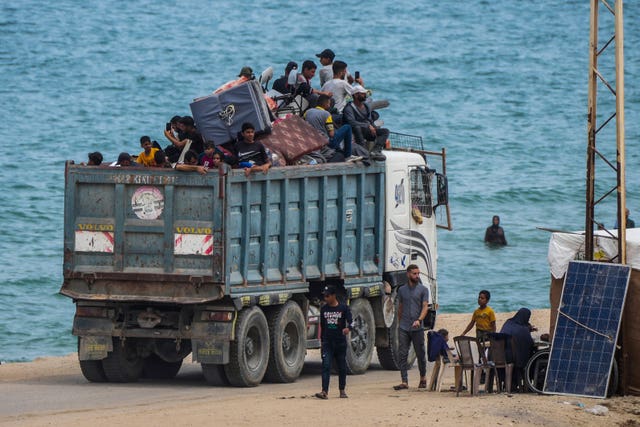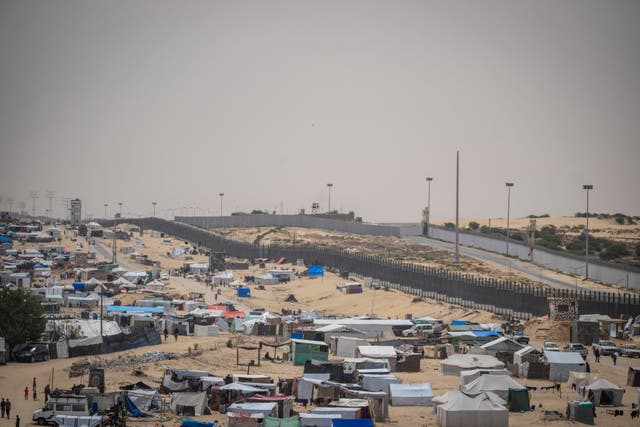The Biden administration has said that Israel’s use of US-provided weapons in Gaza likely violated international humanitarian law but wartime conditions prevented US officials from determining that for certain in specific air strikes.
The administration’s findings of “reasonable” evidence to conclude that its ally had breached international law in its conduct of the war in Gaza, released in a summary of a report being delivered to Congress on Friday, represent the strongest such statement from Biden officials.
But its caveat that it was unable immediately to link specific US weapons to individual strikes by Israeli forces in Gaza could give the administration leeway in any future decision on whether to restrict US provisions of offensive weapons to Israel.

The administration’s findings, a first-of-its-kind assessment that was compelled by President Joe Biden’s fellow Democrats in Congress, come after seven months of air strikes, ground fighting and aid restrictions that have claimed the lives of nearly 35,000 Palestinians, mostly women and children.
While US officials were unable to gather all the information they needed on specific strikes, “given Israel’s significant reliance on US-made defence articles, it is reasonable to assess that defence articles … have been used by Israeli security forces since October 7 in instances inconsistent with its IHL obligations or with established best practices for mitigating civilian harm”, the report said, using an abbreviation for international humanitarian law.
While Israel’s military has the experience, technology and know-how to minimise harm to civilians, “the results on the ground, including high levels of civilian casualties, raise substantial questions as to whether the IDF is using them effectively in all cases”, the report said.
Mr Biden has tried to walk an ever-finer line in his support of Prime Minister Benjamin Netanyahu’s war against Hamas.
He has faced growing rancour at home and abroad over the soaring Palestinian death toll and the onset of famine, caused in large part by Israeli restrictions on the movement of food and aid into Gaza.
Tensions have been heightened further in recent weeks by Mr Netanyahu’s pledge to expand the Israeli military’s offensive in the crowded southern city of Rafah, despite Mr Biden’s adamant opposition.
Mr Biden is in the closing months of a tough re-election campaign against Donald Trump.
He faces demands from many Democrats that he cut the flow of offensive weapons to Israel and denunciation from Republicans who accuse him of wavering on support for Israel at its time of need.
The Democratic administration took one of the first steps towards conditioning military aid to Israel in recent days when it paused a shipment of 3,500 bombs out of concern over Israel’s threatened offensive on Rafah, a southern city crowded with more than a million Palestinians, a senior administration official said.

The presidential directive, agreed to in February, obligated the defence and state departments to conduct “an assessment of any credible reports or allegations that such defence articles and, as appropriate, defence services, have been used in a manner not consistent with international law, including international humanitarian law”.
The agreement also obligated them to tell Congress whether they deemed that Israel has acted “arbitrarily to deny, restrict, or otherwise impede, directly or indirectly”, delivery of any US-supported humanitarian aid into Gaza for starving civilians there.
Legislators and others who advocated for the review said Mr Biden and previous American leaders have followed a double standard when enforcing US laws governing how foreign militaries use US support, an accusation the Biden administration denies.
They had urged the administration to make a straightforward legal determination of whether there was credible evidence that specific Israeli air strikes on schools, crowded neighbourhoods, medical workers, aid convoys and other targets, and restrictions on aid shipments into Gaza, violated the laws of war and human rights.
Their opponents argued that a US finding against Israel would weaken it at a time it is battling Hamas and other Iran-backed groups.
Any sharply critical findings on Israel are sure to add to pressure on Mr Biden to curb the flow of weapons and money to Israel’s military and further heighten tensions with Mr Netanyahu’s hard-right government over its conduct of the war against Hamas.
Any finding against Israel could also endanger Mr Biden’s support in this year’s presidential elections from some voters who keenly support Israel.

At the time the White House agreed to the review, it was working to head off moves from Democratic legislators and independent Senator Bernie Sanders of Vermont to start restricting shipments of weapons to Israel.
Israel launched its offensive after an October 7 assault into Israel, led by Hamas, killed about 1,200 people.
Two-thirds of the Palestinians killed since then have been women and children, according to local health officials.
US and UN officials say Israeli restrictions on food shipments since October 7 have brought on full-fledged famine in northern Gaza.
Human rights groups have long accused Israeli security forces of committing abuses against Palestinians and have accused Israeli leaders of failing to hold those responsible to account.
In January, in a case brought by South Africa, the top UN court ordered Israel to do all it could to prevent death, destruction and any acts of genocide in Gaza, but the panel stopped short of ordering an end to the military offensive.
Israel says it is following all US and international law, that it investigates allegations of abuse by its security forces and that its campaign in Gaza is proportional to the existential threat it says is posed by Hamas.

Mr Biden in December said “indiscriminate bombing” was costing Israel international backing.
After Israeli forces targeted and killed seven aid workers from the World Central Kitchen in April, the Biden administration for the first time signalled it might cut military aid to Israel if it did not change its handling of the war and humanitarian aid.
Presidents Ronald Reagan and George HW Bush, in the 1980s and early 1990s, were the last presidents to openly hold back weapons or military financing to try to push Israel to change its actions in the region or towards Palestinians.
A report to the Biden administration by an unofficial, self-formed panel including military experts, academics and former State Department officials detailed Israeli strikes on aid convoys, journalists, hospitals, schools and refugee centres and other sites.
They argued that the civilian death toll in those strikes – such as an October 31 strike on an apartment building reported to have killed 106 civilians – was disproportionate to the blow against any military target.
